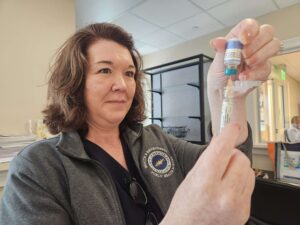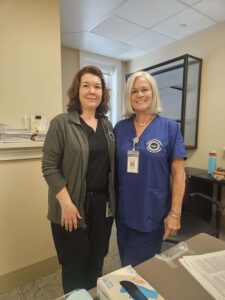EASTHAM — For the past month, clinics across Cape Cod have been offering free measles, mumps, and rubella (MMR) vaccinations. Measles — which had been eliminated in the U.S. in 2000, according to the Centers for Disease Control — has been on the rise since an outbreak began in West Texas in January.

So far, there have been 1,088 confirmed cases in the U.S., according to CDC data. Most of those people were not vaccinated against the disease.
As of June 3, no measles cases have been confirmed in Massachusetts, but Barnstable County Dept. of Health and Environment Director Jay Gardiner said the county aims to be proactive, especially given Cape Cod’s status as a “hospitality community.” With the tourist season beginning, Gardiner said, an importation of the disease is possible.
A first vaccination clinic was held in Provincetown on April 23; about a dozen people came, Gardiner said. Twenty-six came to a clinic in Orleans the following Wednesday, and a clinic at Nauset High School in Eastham drew 24 people, many of them members of the school’s faculty.
The measles virus, which can cause pneumonia and encephalitis, is airborne and extremely contagious. According to the CDC, the virus can survive outside the body for two hours after an infected person leaves a room, and 9 out of 10 unvaccinated people will contract the virus after being exposed to it.
“It’s a huge amount of work to figure out who’s been exposed, to follow up with them, and to make sure they don’t expose other people,” said Lea Hamner, the county’s epidemiologist. “If they come to an undervaccinated community, especially a close-knit one, we might see an outbreak.”
That’s what happened in the Southwest, Hamner said: 96 percent of patients in that outbreak were either unvaccinated or of unknown vaccination status. All three people who have died from measles this year were unvaccinated. “For a preventable disease, that’s tragic,” Hamner said.
The county’s measles vaccination rate among kindergartners was 93.9 percent in the 2023-2024 school year, the most recent one for which the state Dept. of Public Health has published data. The statewide average that year was 96.3 percent.
The same data show that 3.5 percent of Barnstable County’s kindergartners have a religious or medical exemption from vaccination on file — the second highest rate in the state after Dukes County’s 4.8 percent.
Trying to acquire “natural immunity” to the measles virus by direct exposure to it is especially dangerous, Hamner said, due to a phenomenon called immune amnesia. A 2019 report in the journal Science said that the measles virus attacks and destroys antibodies that protect people against other pathogens — erasing the immune system’s acquired response to other diseases.
“Basically, if someone gets measles, the virus causes our immune systems to forget the immunity we’ve already built to other infections,” Hamner said. “In countries that have had measles outbreaks, we see an increase in other infectious disease mortality.”
Vaccines are especially recommended for people who travel to areas with active measles transmission, Hamner said, adding that “traveling unimmunized is a way to get the worst souvenirs.”
If you think you have measles, it is “absolutely imperative” that you call your health-care provider before going to a clinic, Hamner said.
“The provider will see you, but they will make sure you enter the building in a way that doesn’t expose everyone,” she said.
Who Needs a Shot?
The current MMR vaccine was introduced in 1968 and is 93 percent effective against the virus and 97 percent effective with two doses, Hamner said. A less effective version of the vaccine was distributed between 1963 and 1967, however, and health authorities recommend that anyone vaccinated during that time get a second dose now.

People born before 1957 are presumed to have been directly exposed to measles because the disease was still circulating at that time, but even people who are presumed to have such immunity can get a vaccine. In fact, almost anyone who wants the vaccine can get it, according to Wendy Judd, a public health nurse who screens patients at the county vaccine clinics.
“We won’t turn someone away unless the vaccine is contraindicated,” Judd said.
Cape Cod’s large population of seniors “may have more underlying conditions,” Judd said, and some people “may not be able to safely get the vaccine,” since it contains a weakened but still living form of the virus. It is safe and effective for most people but can cause problems for people whose immune systems are severely compromised, which is why community-wide resistance to outbreaks is important, Judd said.
That resistance is more difficult to establish when people choose not to be vaccinated. “We can’t judge their reasoning,” Judd says, “but it amplifies the importance of vaccinating everyone else to protect those who don’t.”
‘Mistrust of Medicine’
Anti-vaccine sentiment is sometimes correlated with mistrust of government — but on Cape Cod, it’s often more closely linked to a mistrust of Western medicine.

Lee Wotherspoon, who works at the Community Health Center of Cape Cod and also owns the Quiet Mind yoga studio in Wellfleet, says that holistic health figures and social media influencers often frame vaccines as “unnatural and unnecessary,” leading to anti-vaccine sentiment in the wellness community.
Holistic healers place “a well-intended emphasis on living well and as close to nature as possible,” Wotherspoon said, “but that overlaps with a mistrust of conventional medicine. When there’s mistrust, it makes it harder for people to ground their critical thinking in evidence-based information.”
Wotherspoon said she rarely comes across anti-vaccine opinions but that could be because of her other career in public health. When it comes to social media, “the algorithms involved with anti-vax sentiment don’t find me,” she said.
Stefan Piscitelli, owner of the Outermost Yoga studio in Provincetown, said he saw resistance to vaccines increase during the initial rollout of the Covid vaccine in 2021. It “isn’t a big problem” here in terms of numbers, he said — particularly because so many people in Provincetown “decided to ostracize anyone who didn’t comply.”
Relatively few people in Provincetown’s wellness community actually skipped the Covid vaccine, but the fallout still led to “a sense of loss of community for everybody involved,” he said.
Piscitelli said that misinformation about Western medicine comes from the unregulated nature of “alternative” health care. “There’s a drive to be on the front edge of new things,” he said. “Every wellness influencer is trying to sell a product, and in order to sell a product you need to make it sound like it’s going to work.” Often, that means making it sound better than what scientific medicine is offering.
Wotherspoon said there are many valid criticisms of the American health-care industry — “there are issues of access and affordability, and we don’t have a health-care system that, from a financial standpoint, incentivizes good care.” But she doesn’t think that should translate to distrusting Western medicine.
“I’ve never considered what I do to be ‘alternative health,’ but sometimes wellness is considered that way,” Wotherspoon said. “To me, yoga, meditation, and massage aren’t an alternative to something else; they add to your life.”



